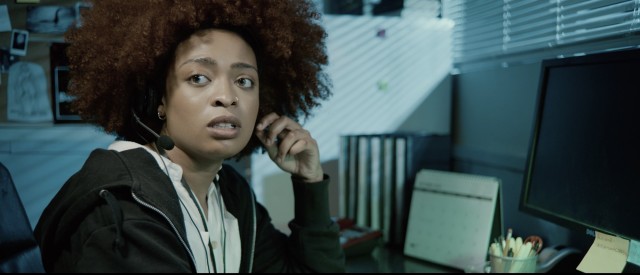The clichés of the horror genre are so ingrained in the public consciousness that entire premises of films can be based around the subversion of them. Case in point: Don’t Die First, a slick and self-aware satirical horror comedy about a self-help line designed to help Black people make their way through horror situations unscathed. It’s an immediately grin-inducing premise that feels like a Jordan Peele film was crossed with the DNA of Cabin in the Woods: an eye-wink of a concept that manages to shine a light on racial dynamics in slasher flicks while simultaneously having a great reverence for them. It’s funny and fast-paced, until, well, it isn’t…
The real magic trick of Don’t Die First, a film that feels very sketch-like via a cursory glance, is how it ends up culminating into something sharp and biting in its critique of society. After all, in a world where it’s easy to avoid ghosts, ax-wielding psychopaths, and supernatural monsters via a simple phone call, what happens when an unarmed Black man encounters something far more sinister…something very much based in reality…something where there isn’t a playbook to follow? Somehow the transition works without feeling preachy: the message isn’t subtle, but the shift in tones is deftly handled. It’s all a big joke until the rug pull moment when you realize that writer/director Daniel B. Foster has something much deeper on his mind.

The ‘Don’t Die First’ helpline promises to keep “Black people safe during horror situations”.
Self-aware horror has been a cinematic staple since Scream, and it’s a somewhat tired observation at this point that Black folks are historically underrepresented and underdeveloped as characters within them. But, I’d argue that Don’t Die First is the rare sort of “sketch premise” that figures out a way to evolve beyond the cursory jokes. Sure, the intro stuff is amusing, from goofy visual gags (“Don’t f-ck the doll!”) to quippy one-liners and general banter between the veteran and rookie call-center operators. But, the juxtaposition between “horror fantasy” and “horror reality” is what really sparked our curatorial interest. After all, the ostensible “horror” moments in the film are played for laughs (complete with cheesy acting and fourth-wall-breaking glances), it’s when things get “real” that stuff actually gets scary.
There has been no shortage of short films made over the past few years dealing with police violence (one even won the Oscar this year), but the contrast being presented here is legitimately thought-provoking in a way that you might not expect based on the cheeky premise. Foster is clear with what he is saying without ever being blunt or preachy about it. It’s also not glorifying violence or police brutality purely to relish in the misery of it (e.g. we never see the inevitable encounter). As reckoning with police violence has become a defining cultural topic, I’d argue that Don’t Die First is one of the rare short films about the subject that figures out a tonal and structural juxtaposition to make its point without feeling like a PSA.

 Ivan Kander
Ivan Kander